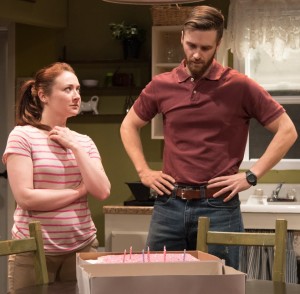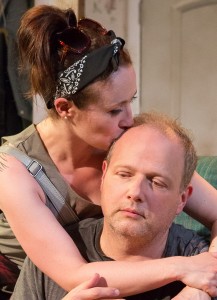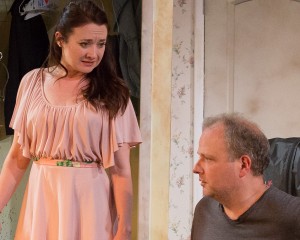Noah Mease’s play Omega Kids takes its name from a fictional comic book at the center of its story. In the comic, eight super-powered teens regroup in their hideaway following the traumatic loss of their leader. The weight of the past and apprehension for the future create a recriminatory atmosphere that threatens to turn violent until Kyle Kelley, the “Insomniac,” puts everyone to sleep. When Lucas Augur, “recently magical,” wakes up, he and Kyle take the first halting steps toward romance, acting on an attraction that until now has been merely implicit. The play itself is about a different pair of traumatized youths stumbling toward connection. What they’re looking for in each other, however, can’t be so easily classified.
(Un)Happy Family
Tolstoy said: “Happy families are all alike; every unhappy family is unhappy in its own way.” The origins of unhappiness are certainly a unique combination for every family. For the one in Ann Adams’s Strange Country, directed by Jay Stull at the Access Theater, mental illness, lack of loyalty, and addiction are the sources that lead to complications between siblings.
The play opens on a one-room efficiency apartment: beer cans, leftover foods and trash are strewn everywhere. The occupant, Darryl (Sidney Williams), is fast asleep on the couch, until his sister, Tiffany (Vanessa Vache), lets herself in. After she puts food in the refrigerator, she assesses the situation and wakes him up by spraying him with Fabreze. Roused from his sleep, Darryl cries: “That shit will give you cancer!” The irony of the line is not lost on Tiffany. Darryl is a slob who seems completely unconcerned with his personal hygiene, the cleanliness of his apartment, or his health. He even confesses that he medicates himself on a steady stream of beer and meds.
Tiffany gently tosses back an ironic barb of her own: “Maybe you’ll eat your dinner one day, rather than drink it.” As Tiffany bangs around the apartment trying to clean up, she orders her brother to go wash up so they can go to their mother’s re-commitment ceremony. This brings on a stalemate.
Tiffany seems abrasive and angry, but underneath her volatile outbursts and no-nonsense demeanor is a woman who really cares about her family. If she didn’t care so much, she wouldn’t spend her morning goading Darryl and trying to do what’s best for her family. This concern extends to her girlfriend, Jamie (Bethany Geraghty), who is stony-faced and avoids eye contact with Darryl. She seems highly displeased with the situation.
At one point in the play, which moves along organically even though the dialogue is a bit stultified in places, Darryl and Jamie find themselves alone in Darryl’s apartment. Darryl is thrilled to discover they are both trying to move forward while simultaneously being moored by addiction. He practically whoops: “You’re the first person who’s made me feel good about myself” and “You’re more fucked-up than me!”
While Tiffany tries hard to keep the family together, Darryl steadily consumes beer. As he opens one can after another, the sound of the initial pop of the tab, and then the fizz of the beer become a soundtrack for his character. Nonetheless, Darryl is like the idiot savant, or the fool in Shakespeare’s plays. For all his slovenly drunkenness, he has wisdom and insight. He’s right on when he says plaintively to Tiffany: “The whole of your life is trying to fix people who don’t want to be fixed. But you cling to it.” He knows her life’s purpose is to stay close to her family and try to keep them together, but he can’t help and doesn’t want to.
Strange Country does a good job of capturing the sadness that is brought on when a family member is suffering from a problem that is too difficult to fix. However, it also explores the complicated idea that what may be good for one person may not be good for another. Everyone has his own way of surviving, and the measures people use may not always be the right ones. For Darryl, this is his way of surviving; it’s his “normal.” Tiffany has another “normal,” a more conventional and socially acceptable one. But she doesn’t seem happy. Although Darryl seems less productive and more destructive, he seems more content with his life and himself. It’s a philosophical conundrum.
Strange Country by Anne Adams, produced by New Light Theater Project, runs until Aug. 13 at 8 p.m. Wednesday–Saturdays at Access Theater(380 Broadway at White Street, in Tribeca). Tickets are $15 in advance, $18 at the door, and can be purchased online at: http://www.newlighttheaterproject.com.
American Kitchen Sink
The characters in Utility, Emily Schwend’s drably titled but fascinating new kitchen-sink drama at the Rattlestick Playwrights Theater, belong to a social milieu that seldom appears on the American stage. They’re working-class folks in the lower socioeconomic spectrum. An offer of coffee means heating a mug of water in the microwave and mixing instant powder into it. Work constitutes holding down more than one shift at a time or just picking up shifts sporadically. Dinner, often as not, is reheated leftovers.

The play opens on a porch in east Texas, where Chris, a guy who has recovered from a pill addiction, is trying to wheedle Amber, his wife, into letting him move back in, just to help with the kids. Chris (James Kautz) has been sleeping on a sofa at his older brother Jim’s place, but Amber (Vanessa Vache) is reluctant to let him come back home. In this short prologue, Schwend lets us know further that Chris has cheated on Amber in the past, with someone at work; that he has a daughter, not by her, who is living with her mother; and that Amber is organized and self-sufficient and probably doesn’t need Chris’s supplementary income, even though her finances are stretched thin.
The focal point of the drama is a birthday party for Amber’s daughter, Janie. (Although the children are never seen, Kate Noll’s deft kitchen design reminds us of their presence: there are children’s drawings under magnets on the refrigerator.) Chris isn’t the child’s father—children with various parents are part of the fabric of this social stratum—but is helping to coordinate the birthday, which puts him in good stead with Amber’s mother, Laura (Melissa Hurst), who proves an unlikely champion for Chris.
“All I know,” says Laura, “is I seen Chris running around here all day long fixing up this house for a birthday party for a girl ain’t even his own daughter.” But, Amber is on top of school, doctors, and box lunches, and responds, “It’s not like it’s just suddenly easier with him here. I’m the one got two jobs, and he’s still another mouth to feed. Another person in the bathroom in the morning. And in and out of work. Can’t send a check when he says he gonna send a check… And actually? It’s easier when I don’t gotta think about him.” In these passages, Schwend displays a gift for dialogue to convey information and attitudes of her characters.
Meanwhile, Jim (Alex Grubbs) is working on restoring Amber’s house, which has apparently been damaged by flooding. He’s in and out of the building, and his presence irritates Amber even though he’s doing the work gratis. He doesn’t get much sympathy from Laura either; she has only a cold shoulder for him.
Director Jay Stull keeps tension in the action and yet lets the strands of Schwend’s drama play out, sometimes just a bit sluggishly, and at others in a pleasantly leisurely way—there’s a late scene that is daringly silent for a considerable stretch while Amber just smokes. His cast is superb. Vache is a grounded, skeptical Amber, a woman perhaps too easily irritable, but also hurt once too often by Chris. She is a formidable protagonist. Kautz finds in Chris an easygoing decency; whatever his past has been, he has left it behind, but he is also not a fully operational adult. The play’s title comes from the utility bill he has forgotten to put money down on—paying it all would be too much for this family—and the power suddenly goes off the day before the birthday party. Hurst’s Laura is also a bit of a strain for Amber; what help she offers comes with opinions, not just about Chris and Jim, but about the danger of vaccines, for instance; at the same time, she has money she has put by and is willing to lend if needed.
Finally, Grubbs as Jim gives a marvelous performance: laconic, grounded and probably in love with Amber. He finds comedy in the deadpan character, and in the comparatively brief amounts of dialogue he is given he manages to convey decency, yearning and self-restraint. The word, “utility,” carries a double meaning of electrical power and “usefulness.” In that sense, the title is apt because the work serves as a useful calling card for Schwend’s dramatic talents as well as the cast’s.
The Amoralists’ production of Utility plays through Feb. 20 at the Rattlestick Playwrights Theater (224 Waverly Place between West 11th and Perry Sts.) in Manhattan. Performances are Thursday-Saturday at 8 p.m., with a special Wednesday evening performance on Feb. 17, and a 3 p.m. matinee on Feb. 14. Tickets are $18 and may be purchased by calling 866-811-4111 or visiting https://web.ovationtix.com/trs/pr/953828.










